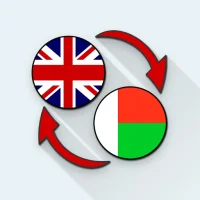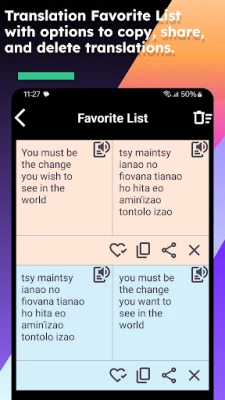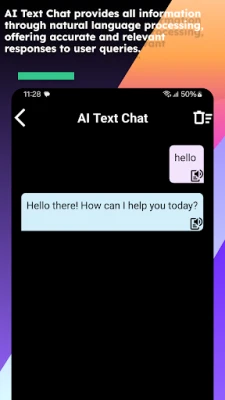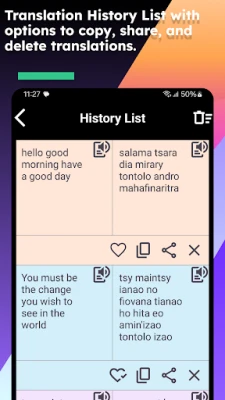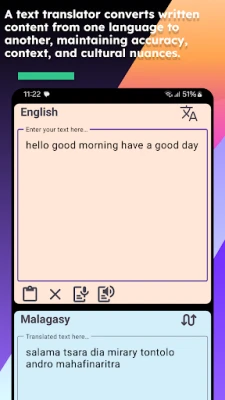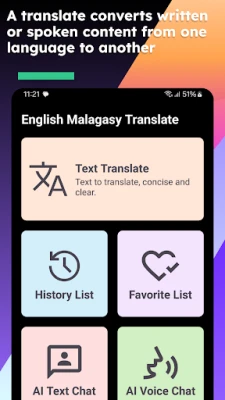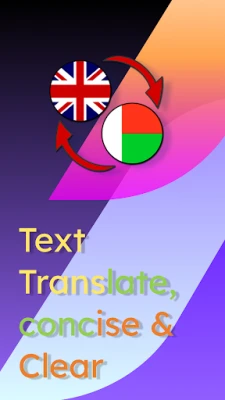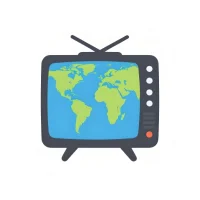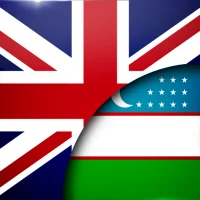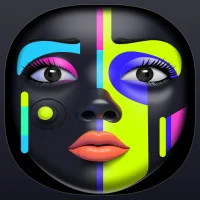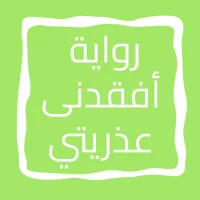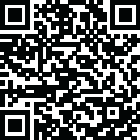
Latest Version
46.0
June 30, 2025
xw infotec
Tools
Android
0
Free
xwinfotec.englishmalagasytranslate
Report a Problem
More About English Malagasy Translate APK Download for android
Thinking About How to Translate English to Malagasy — A Barber’s Random Thoughts
Okay, so here’s a thing I never thought I’d be writing about: translating English to Malagasy. Yeah, the language from Madagascar. It’s not something I mess with every day, but I’ve been running into it more than I expected lately. Like, people asking me, “Hey, can you help me translate English to Malagasy?” or “Is there a good way to do this without sounding like a robot?”
I’m no linguist or anything, just a guy who cuts hair and chats with all kinds of folks. But the way language works, especially between two pretty different ones like English and Malagasy, is kinda fascinating. So, I figured I’d jot down some thoughts on it. Nothing fancy, just how it feels to someone who’s picked up bits here and there.
Why Even Bother to Translate English to Malagasy?
You might wonder why someone would need to do this at all. I mean, English is everywhere. But Madagascar’s a big island with its own culture, and Malagasy is the main language. If you wanna connect with locals, do business, or just not look like a total tourist, learning to translate or at least get the gist is useful.
Plus, Malagasy ain’t an easy language to just pick up. It’s got its own rhythm, phrases, and sometimes the words don’t match English at all. You can’t just do a word-for-word swap and hope it sounds right. It’s like cutting hair — you can’t just follow one style for every client. You gotta adjust.
The Struggle of Direct Translation
So many times I’ve seen people try to translate straight from English to Malagasy using some app or online tool. The result? Awkward sentences. Like when a customer asks for a fade but says “make my hair disappear” — it’s funny because it’s kinda true but just sounds off.
It’s the same with languages. Direct translation can miss the point. Some words or expressions in English don’t have exact Malagasy counterparts, or the meaning shifts depending on context.
I remember helping a friend who needed a sign translated for his shop in Antananarivo. If we did literal English-to-Malagasy, it would’ve sounded like a robot wrote it. So we tweaked the phrasing, kept the meaning but made it sound natural for locals. That’s the goal.
Tools to Help You Translate English to Malagasy
If you’re not fluent (and honestly, most people aren’t), there are a few ways to get help.
-
Online translators: Google Translate supports Malagasy now, but don’t rely 100% on it. It can be clunky or miss nuance.
-
Language apps: Some apps focus on Malagasy phrases, which is handy for travelers.
-
Local speakers: Nothing beats asking a Malagasy speaker to check your translation or help with tricky parts. It’s like having a barber check your haircut before the customer walks out.
-
Forums and groups: Places like Reddit or Facebook have communities where people help with translations.
One thing I learned: double-check your translations if it’s something important. You don’t want a simple sign or message to come off weird or worse, rude.
The Beauty of Malagasy Language
Gotta say, Malagasy has some cool quirks. It’s Austronesian but with influences from Africa, Arabia, and even France. The structure’s different from English, but it’s melodic in its own way.
Like, in Malagasy, verbs often come with prefixes and suffixes that show tense or mood — so translating English verbs directly gets tricky. Sometimes a simple English sentence turns into a longer Malagasy one, or vice versa.
Also, politeness and respect come through in language. You can tell a lot about Malagasy culture just by how formal or casual someone speaks. It’s not just words but attitude.
When You Should Hire a Pro
If it’s something simple — like a phrase or casual conversation — dabbling with apps or friends is okay. But for business documents, signs, or anything public-facing, it’s smart to hire a real translator.
A friend of mine once tried to DIY his business card translation. Ended up with a phrase that made people laugh (not in a good way). So, saved some money upfront, lost it in reputation later.
Professional translators understand both languages and cultures, and they’ll make sure your message hits right.
Final Thoughts (Not Really a Conclusion)
Look, translating English to Malagasy isn’t rocket science, but it ain’t just typing words into a box either. It’s part skill, part feel, and a lot of patience. You gotta know the language’s soul, not just the dictionary.
If you’re traveling to Madagascar or doing business, do yourself a favor and learn a bit. At least get comfortable with the basics and the common phrases.
And if you’re stuck, don’t be shy to ask around. Malagasy people appreciate the effort, even if you butcher the pronunciation a little.
Anyway, that’s it for now. If I pick up more tips or mess with it again, maybe I’ll write more. Till then, gotta get back to cutting hair and chatting with customers about all kinds of stuff — including random languages.
Rate the App
User Reviews
Popular Apps



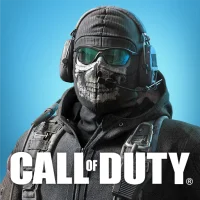


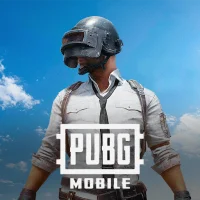
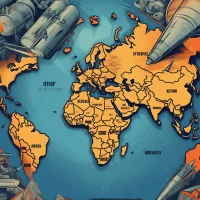


Editor's Choice










